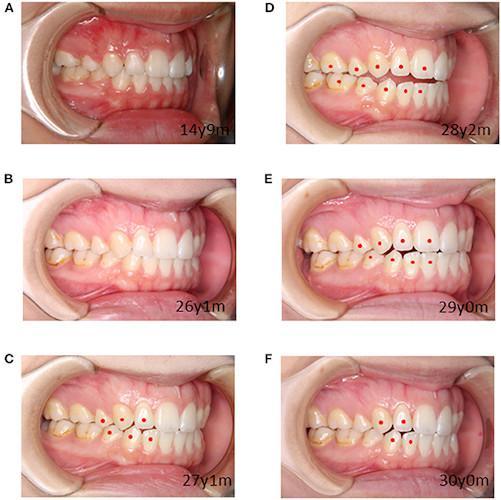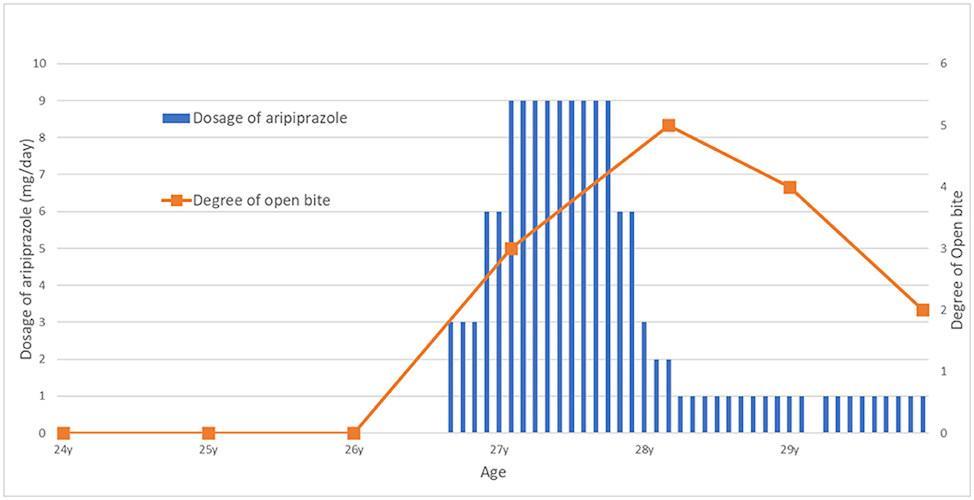According to a case report, aripiprazole caused an open bite in a 27-year-old woman, and malocclusion worsened as the dose increased.

The authors suggested that the patient's abnormal masticatory muscle tension caused by the antipsychotic was associated with the development of her open bite. This is believed to be the first case of aripiprazole-induced open bite as a symptom of extrapyramidal side effects (EPS).
“Medication-induced open bite should always be considered as a cause that can be corrected prior to orthodontic treatment,” write the authors, led by Dr. Takahiko Nagamine of the Tokyo Medical and Dental University in Japan.
A 27-year-old woman with an open bite
At the age of 12, the patient underwent orthodontic treatment due to malocclusion. After two years of treatment, she wore a removable brace for three years. After the retention period, it was observed every year, the teeth and bite remained in a healthy state.
(A) Anterior view of open bite. (B) Occlusal view of the open bite.

At the age of 24, the patient developed depression and was prescribed treatment in a psychiatric clinic. After taking selective serotonin reuptake inhibitors for three years with limited improvement, they were discontinued due to gastrointestinal symptoms. During this time, dental examinations did not reveal an open bite.
At the age of 27, the patient was diagnosed with an open bite. At that time, depression was already being treated with aripiprazole. Initially, the dosage was 3 mg per day, and within three months increased to 6 mg per day. Since the cause of the open bite could not be determined, the doctors did not resume orthodontic treatment. Instead, the observation continued.
Unfortunately, the degree of open bite, which is determined by the height of the gap between the dentition and the number of teeth that do not close, has worsened to the third degree. Three months later, the dose of aripiprazole was again increased to 9 mg daily for eight months. During this time, the open bite became more severe, and qualified as a fifth-degree open bite.
How the patient's open bite has changed over the years. Red dots are marked on non-contact teeth, and the number of separated tooth types indicates the degree of open bite: (A) Grade 0, (B) Grade 0, (C) Grade 3, (D) Grade 5, (E) Grade 4, (F ) Degree 2.

The dose of aripiprazole was later reduced to 6 mg, 3 mg and 1 mg daily. The depression did not worsen, and the open bite gradually improved. The woman no longer has symptoms of depression, is off aripiprazole, and has no bite problems, the authors wrote.
Unusual Cause of Open Bite
Open bites are mainly caused by thumb or pacifier sucking, tongue sticking out, temporomandibular joint disease, and non-standard skeleton. In addition to these factors, muscle tension can sometimes lead to an open bite, as the movement of the mandible, combined with the masseter, medial pterygoid, and temporalis muscles, results in occlusion. Therefore, drugs that affect muscle tone can cause an open bite.
This figure shows the relationship between aripiprazole dosage and the patient's degree of open bite.

In this case, there was no evidence that the woman had dystonia, dyskinesia, or other involuntary movements. Because the patient had no history of taking strong D2 receptor blockers such as risperidone, “the open bite in this case is most likely caused by aripiprazole,” the authors write.
Another similar case reported an antipsychotic-induced open bite in a patient taking the first-generation antipsychotic drug haloperidol. The patient had generalized EPS, including open bite. However, the experience with aripiprazole may have been different as it is an atypical antipsychotic and is associated with a lower incidence of systemic EPS than typical antipsychotics such as haloperidol.
The frequency of EPS caused by aripiprazole is insignificant, and they occur more often in adolescent patients. Therefore, dentists must take careful history when treating children and adolescents with open bites.
“However, open bite developed in relation to the time of aripiprazole dosing and tended to worsen with increasing aripiprazole dose and improve with dose reduction,” write Nagamine and colleagues.
